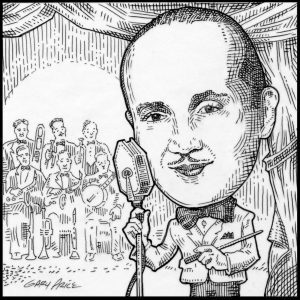 James Fletcher Hamilton Henderson, Jr., was born in Cuthbert, Georgia, on December 18, 1897. His parents were both educators, and his mother gave him and his brother Horace piano instruction from an early age. By adolescence, he was a proficient sight-reader and had developed near-perfect pitch. Despite his obvious musical ability, he opted for studies in math and science.
James Fletcher Hamilton Henderson, Jr., was born in Cuthbert, Georgia, on December 18, 1897. His parents were both educators, and his mother gave him and his brother Horace piano instruction from an early age. By adolescence, he was a proficient sight-reader and had developed near-perfect pitch. Despite his obvious musical ability, he opted for studies in math and science.
At age 18, when he matriculated at Atlanta University, he dropped his first name (James) and was Fletcher Henderson thereafter. His bachelor’s degree was in chemistry and math, and in 1920 he moved to New York City with the intent of earning his master’s at Columbia University and pursuing a career as a chemist. When his pianist roommate fell ill, Fletcher substituted for him on a gig and did well enough to be hired full-time. Also working as a song demonstrator for the Pace and Handy Music Company, he soon discovered that a music was a more lucrative field than chemistry.
In 1921, Harry Pace dissolved partnership with W.C. Handy to form Black Swan records, and Fletcher Henderson came along as musical director. From 1921 on, Henderson recorded and performed prolifically as a soloist, accompanist, and bandleader. By the summer of 1924, Henderson hired cornetist Louis Armstrong, whose hard-swinging approach to music was a revelation to the Henderson band. Until Louis joined, they offered rather stately fox trots, leavened by occasional jazz solos. By the time Armstrong left the brass section, the band had learned how to swing.
The Fletcher Henderson Orchestra was a big band, and arrangements were required. Reedman Don Redman was a gifted arranger and, in the 1920s, provided some of the band’s best charts. Benny Carter followed Redman with his own excellent scores. But Henderson’s own band writing would gain him lasting renown—through performances led by another bandleader.
In the 1930s, when Henderson had fallen on hard times, he sold arrangements to Benny Goodman, whose fame would soon far eclipse his own. Henderson wrote doggedly to keep up with the demand. Henderson formed and broke up various bands during the ’30s and ’40s, played piano for Ethel Waters and for Goodman himself but was never accorded due recognition as leader of the first real swing band. Two years after suffering a debilitating stroke, Fletcher Henderson died on December 29, 1952.
Also Read: Fletcher Henderson: Profiles in Jazz and Fletcher Henderson (1897-1952)
To learn more about Gary Price visit ArtistGaryPrice.com & www.PutAPriceOnTheArts.com
Andy Senior is the Publisher of The Syncopated Times and on occasion he still gets out a Radiola! podcast for our listening pleasure.




















